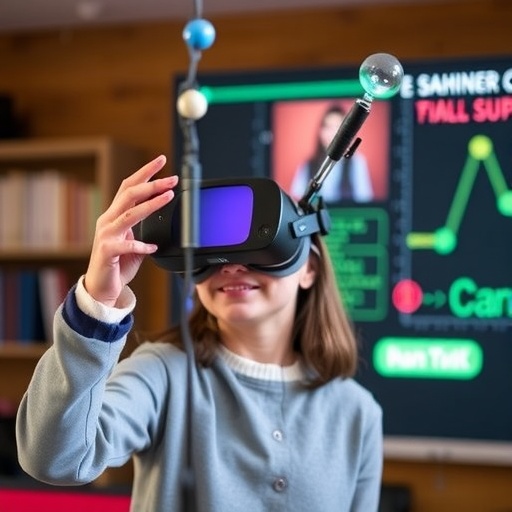Immersive Virtual Reality (VR) has become a pivotal technology in contemporary educational settings, revolutionizing the ways in which students engage with learning material. Notably, a recent study conducted by Irwanto, Lintangnicita, and Cahyana explores the impacts of immersive VR on the creative thinking disposition and academic achievement of 11th-grade students. The research delves into the effective integration of this cutting-edge technology into educational curricula, shedding light on how VR can serve as a powerful learning tool.
In traditional learning environments, educators often face challenges in developing students’ creative thinking skills while simultaneously enhancing their academic performance. Consequently, this study addresses the pressing need for innovations that can meet these dual objectives. It anticipates that by immersing students in a 3D virtual environment, not only will their engagement levels rise, but their problem-solving skills and creativity will also be substantially enhanced. The researchers hypothesized that immersive VR could provide a unique platform for stimulating cognitive engagement, thereby fostering an innovative mindset.
The methodological framework of the study involved an experimental design where a control group of students was taught through conventional methods, while another group experienced lessons delivered via immersive VR. By comparing the academic performance and creative thinking dispositions of both groups, the researchers aimed to isolate the specific effects of the immersive VR experience. This rigorous approach provided valuable insights into how such technology can be effectively leveraged in education.
Results from the study indicated that students exposed to VR not only performed better academically but also exhibited a significant enhancement in their creative thinking skills. Those who learned with the aid of VR displayed greater willingness to engage in innovative problem-solving activities, showcasing the technology’s potential to cultivate a classroom culture that encourages creativity. The study also emphasized that students generally found VR lessons more enjoyable and stimulating, which in turn contributes positively to their overall academic experience.
Moreover, the research identified specific factors that contributed to the effectiveness of VR in fostering creativity. These factors included the immersive nature of VR, which allows students to experience concepts in a tangible way, and the ability of VR to simulate real-world scenarios, thereby enhancing the relevance of learning material. This simulation capability not only boosts interest among learners but also encourages them to think critically about various problems by applying theoretical knowledge in practical contexts.
Despite the numerous advantages outlined in the study, the researchers cautioned against the uncritical adoption of VR technology in all academic settings. They acknowledged that the implementation of VR requires careful planning, tailored content, and training for educators to maximize its potential benefits. Furthermore, the cost of VR technology and the need for adequate infrastructure could pose significant barriers to its widespread use in schools.
In addition to academic improvement, the findings suggested that VR could play a key role in developing soft skills among students. As they navigated through immersive environments, learners practiced collaboration, communication, and adaptability—skills that are increasingly crucial in today’s ever-evolving workforce. These non-academic skills often correlate strongly with long-term professional success, leading to the conclusion that the benefits of VR extend beyond merely improving grades.
The implications of this research are significant for educators, policymakers, and technology developers alike. By integrating immersive VR into the educational curriculum, schools may not only enhance students’ immediate learning experiences but also equip them with the skills they need in a challenging future landscape. Emphasizing creativity and innovation, such initiatives can lead to a more engaged and proactive student body ready to tackle complex problems.
Furthermore, the study calls for further investigation into the long-term effects of VR on learning outcomes. While the results demonstrate short-term improvements in both creative thinking and academic achievement, researchers are keen to explore how sustained exposure to VR environments influences these skills over time. Longitudinal studies are essential for understanding the lasting impact of immersive experiences on cognitive development.
In conclusion, the research by Irwanto, Lintangnicita, and Cahyana provides a compelling argument for the integration of immersive VR into educational settings. By harnessing the unique capabilities of this technology, educators can foster an environment that prioritizes creative thinking and academic success. Nevertheless, the transition toward VR-enhanced learning necessitates careful consideration of various factors to ensure that the advantages are fully realized. As this innovative approach continues to gain traction, it could redefine the landscape of education, paving the way for more dynamic and interactive learning experiences.
The study not only underscores the promise of immersive VR to make learning more engaging; it also challenges educators and institutions to think critically about the future of education. Does traditional pedagogy adequately prepare students for the complexities of contemporary life? Or is it time to embrace revolutionary methodologies that integrate technology? The answers to these questions will shape the educational endeavors of tomorrow, making further research and exploration into immersive VR necessary in the years to come.
By highlighting the research findings and potential implications, it becomes apparent that creative and innovative approaches can empower both educators and students alike. Moving past conventional teaching methods will ultimately foster a generation of learners who are not only knowledgeable but also capable of thinking outside the box, thus leading to various positive outcomes in society.
Subject of Research: Effects of immersive virtual reality on 11th-grade students’ creative thinking and academic achievement.
Article Title: Examining the effect of immersive virtual reality on 11th-grade students’ creative thinking disposition and academic achievement.
Article References:
Irwanto, I., Lintangnicita, T., Cahyana, U. et al. Examining the effect of immersive virtual reality on 11th-grade students’ creative thinking disposition and academic achievement.
Discov Educ 4, 438 (2025). https://doi.org/10.1007/s44217-025-00880-1
Image Credits: AI Generated
DOI:
Keywords: Immersive Virtual Reality, Education, Creative Thinking, Academic Achievement, Innovative Learning




